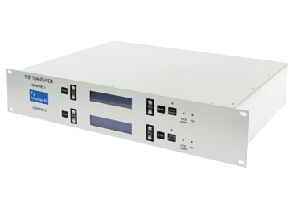AtlanTecRF has launched a Ka-Band version of its Dual Channel Loop Test Translator that offers additional choice to users testing and monitoring signals at satellite communication ground stations and teleports.
This new product features dual channel operation with the ability to introduce different transfer characteristics in each channel. This gives the user a lot of flexibility and means one LTT instrument can be used in a variety of test applications for frequency conversions from Uplink (Tx) to Downlink (Rx) or to L-Band and from L-Band to Downlink (Rx).
The new Ka-band unit addresses the 30 GHz uplink and 20 GHz downlink market. It also enables users to simultaneously test the Tx-L and L-Rx loops. LO phase noise at 27 GHz for the Ka-Band instrument is -110 dBc/Hz at 1 MHz offset and non-signal related spurious are guaranteed at below -60 dBc.
The architecture of each channel contains a synthesized local oscillator (LO), the frequency of which can be changed in either 25 MHz steps or 1 kHz steps so that the Tx and Rx bands relate to the L-Band modem frequencies of 950-1700 MHz or 950-2450 MHz.
The transfer characteristics of each path can also be defined independently in terms of attenuation range, conversion loss and filtering to suit the performance requirements of the individual station.
Control of both LO frequency and transfer attenuation can be managed either locally with easy-to-use touch controls or remotely via Ethernet with GUI, and separately for each of the two links. Frequency stability is assured with a choice of either internal OCXO with better than +/-0.05 ppm over temperature or by an external 10 MHz system source.
"What makes our Dual Channel LTTs unique is the simultaneous translation of transmit frequencies to L-Band and L-band to receive frequencies using one unit. By adding a Ka-Band unit users now have even greater choice when it comes to testing and monitoring uplink and downlink signals at the same time," revealed CEO, Geoff Burling.

